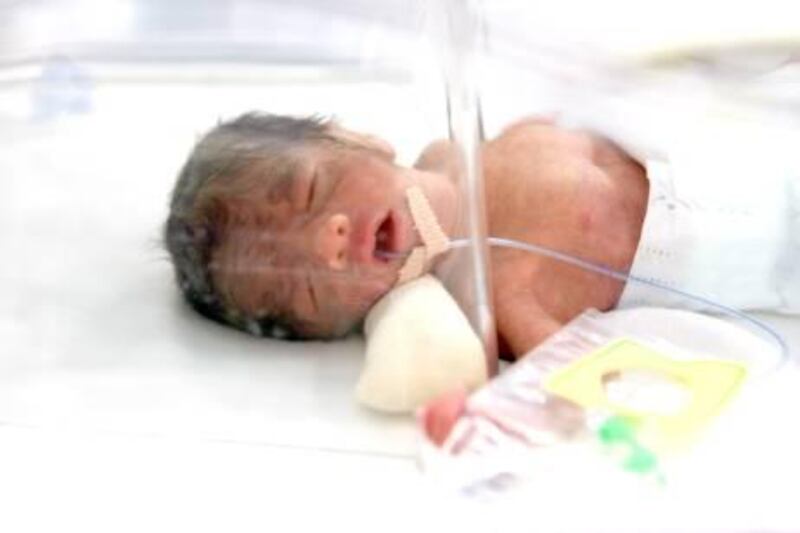FUJAIRAH // Two-year-old Maryam never believed her mother was having triplets.
"There are four babies coming," she said, disregarding what the doctors had told her mum. "Not three."
She was right.
Wafa Ebrahim and Yaqoob Abdullah became the parents of three healthy girls and a boy, all over one kilogram, at about 6am on Sunday at Fujairah Hospital, a first for the medical centre. The ceasarian took 40 minutes.
"When the doctors told me there was another, I thought they were joking," Ms Ebrahim said. "I thought they wanted to wake me up from the drugs."
Her hospital room was a flurry of women wrapped in dark abayas and grandmothers in their prints, dishing out coffee, chocolates and homemade cakes yesterday. None were happier than Yaqoob's father, Abdullah, who always wanted daughters of his own but was blessed instead with two sons.
"All his life he was wishing for a daughter," Ms Ebrahim said. "After the first daughter I had he was so happy. Now that his home is full of children, he is in heaven."
Mr Abdullah will name his first son after his sociable grandfather, a man who loves to gather his family round for walks and outings.
"He's even happier than me," he said. "This is from God, al humdullilah."
The girls will be named by their mother.
"The whole family will decide together," she said.
When Ms Ebrahim had a Dh2,500 fertilisation treatment of injections and tablets, she knew there was a strong likelihood of twins. What she did not expect was a twin set of twins.
The births will be celebrated at a feast similar to that of a wedding, open to the entire family, with over 100 guests.
"Even for one we would do the same," said Ms Ebrahim. "Everyone is in shock, our whole family."
"What she can she do?" said a visiting Emirati cousin. "She can only thank God!"
Amna Abdullah , 60, a mother of nine, offered her reassurance.
"Mothers know how to care for their children," she said. You will be fine."
Ms Ebrahim is accustomed to big families. She is one of 13 sisters and five brothers born to two mothers. Now, the sisters will become additional caregivers.
Mr Abdullah and his wife share a three-bedroom house with his brother, who is married to Wafa's sister. Also in the house is the six-month-old son of Mr Abullah's brother, and Yaqoob's parents.
As Bidoon, their lives ahead will not be easy. The Bidoon, which translates as "without", are a people without passport or citizenship, though most have lived in the UAE for generations before it was a country.
Ms Ebrahim's first challenge will be the lack of birth certificates for her quadruplets, something most UAE Bidoon say has become impossible in recent years. Her six-month old nephew also has no birth certificate, despite multiple trips by his father to the Ministry of the Interior in Abu Dhabi. It is a common situation today. In previous years, it was easier for Bidoon to get a birth certificate.
Mr Abdullah, 27, supports his parents and his brother's family on a salary of Dh4,000 a month as a public relations officer at a quarry. His brother, 20, has not found work yet. It has become increasingly difficult for Bidoon to find work in the UAE, and when they do, it is often for a fraction of what their Emirati compatriots earn.
"For Bidoons, it's very difficult," Ms Ebrahim said. "You should have someone who knows you and lets you work. This all depends on God because at this point there is no support."
Tough times may be ahead for the quadruplets. Bidoon are not eligible for any of the school or hospital fees afforded to their Emirati cousins. The delivery will cost the family Dh10,000.
Maryam's preschool tuition is Dh2,500 per month.
The family is luckier than most Bidoon. With the sale of his grandfather's farm, his father received Dh400,000 that will be put toward the children's education. Ms Ebrahim worked from the age of 17 to pay for her degree in computer programming from Ajman University. She quit after she was married, and immediately got pregnant, at age 25.
Her grandfather's arrival in the UAE predates the country's formation, and he served in its military for decades. Some of Ms Ebrahim's relatives have citizenship. Passport or not, she said she will raise her children as Emiratis.
"We teach them Arabic, we teach them the traditions of the UAE, all that it means to be is in Emirati," said Ms Ebrahim. "We are Emirati ourselves, the only difference is that we pay for services. Otherwise we are the same."
"I hope that we get nationality soon because we heard that this problem will be solved and the sheikhs do support us," she said. "We will see, inshallah. Every child who comes brings some luck."
azacharias@thenational.ae





